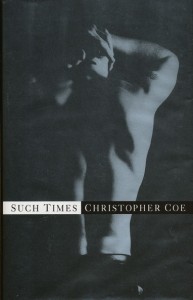 Such Times by Christopher Coe
Such Times by Christopher Coe
I read Coe’s I Look Divine earlier this year after reading about his connection to the Lish workshops and deciding he seemed like my kind of writer. With his first book, I was absolutely correct; it’s a spare portrait of two brothers via one’s memory, and the prose is some of the tightest and most touching I’d read in months. Such Times is Coe’s last book, and its primary concern is the AIDS epidemic and its effect on the lives of three young gay men. It’s a tragedy because Coe himself died of AIDS in the 90s, and I have no idea why this book is so attractive to me at the onset of summer. (…)
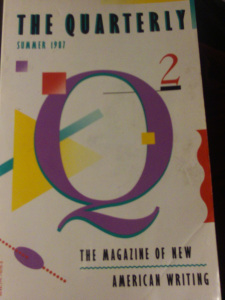 #2 of The Quarterly
#2 of The Quarterly
Again, because of Lish, I started buying up old issues of The Quarterly on the internet from time to time and have been making my way through them. There’s no preamble in these, no discussion of authorial intent, just a nice slim edition from Vintage that immediately thrusts you into the most powerful short storytelling voices in the late 80s. I recognize hardly any names in this one, which will probably mean they’ll all meld together even more so than the last, but I don’t care. The stylistic efforts being made between these pages are fucking huge.
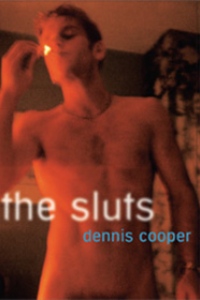 The Sluts by Dennis Cooper
The Sluts by Dennis Cooper
This year was sort of fucked in the face by an extremely fast reading of Cooper’s George Miles Cycle—I intended to write something about it and continue to fail immensely—followed by an equally quick reading of the first Grove Press paperback edition of Sade—the major face-fucking then being done by Philosophy in the Bedroom. I’ve been a fan of Cooper’s for quite some time now, and have read most of his books except for this one. I saw a list somewhere of books that sort of warped Ariana Reines’ perspective, and this was on it, so I’m real excited.
READ MORE >
6 Comments
June 18th, 2013 / 11:00 am
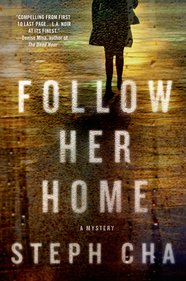 Follow Her Home
Follow Her Home
by Steph Cha
Minotaur Books, April 2013
288 pages / $24.99 Buy from Amazon or Macmillan
Like culture or a chronic condition, noir is a form of being in the world. Easily mistaken for the symptoms of its golden age—a particular black and white era in the imagination, a type of dress, a style of prose—noir is, nevertheless, loyal to none of that. Noir is a persistent suspicion, good at getting in to just about everything. Once inside, it sets to work, changing things—rearranging mental furniture and going monochromatic on the walls till all thoughts feng shui back to the same basic assumption: things are not what they appear.
Steph Cha’s Follow Her Home is a case of noir becoming terminal. It starts innocently enough. The novel’s protagonist Juniper Song, used to like to stay up late reading Raymond Chandler– so much so that she ruined her eyes doing it. The exploits of Phillip Marlowe served as her initiation, by proxy, into an underground world as remote from her nearly blemish-free child and young adulthood as any thing of fantasy could be. Nearly because she lost her father at a young age, before he could become a memory that would haunt her, but whose absence took on a presence when she recognized in Marlowe the figure of a father of the spiritual variety—someone to emulate.
By the time the events of Follow Her Home begin, Marlowe’s influence has trailed Juniper into her late twenties where she lives the ethereal life of an underemployed high-achiever on the drift. A first generation Korean-American with a degree from Yale, Juniper makes ends meet tutoring part time in Los Angeles, living a solitary life in a small, La Brea apartment—not unhappy, but not quite content—voraciously reading bleak detective tales to salve a trauma grimmer and more recent than the untimely demise of her unremembered father. When her old college friend Luke invites Juniper over, ostensibly for an apartment warming party at his posh new Hancock Park pad in a building called “The Marlowe,” only to reveal that he’d like her to snoop confidentially on Lori, another party guest who Luke believes may be secretly seeing his high-powered and unhappily married lawyer father, Juniper—like the soft-boiled wannabe she is—agrees.
READ MORE >
2 Comments
June 17th, 2013 / 11:00 am

Jen Hofer gives us her summer reading list:
***
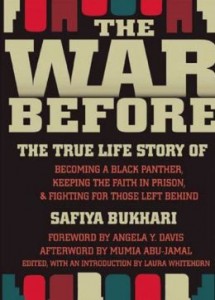 The War Before: The True Life Story of Becoming a Black Panther, Keeping the Faith in Prison and Fighting for Those Left Behind, Safiya Bukhari, ed. Laura Whitehorn (The Feminist Press, 2010)
The War Before: The True Life Story of Becoming a Black Panther, Keeping the Faith in Prison and Fighting for Those Left Behind, Safiya Bukhari, ed. Laura Whitehorn (The Feminist Press, 2010)
WITH
 Pantera negra. El arte revolucionario de Emory Douglas, ed. Sam Durant (Alias, 2012)
Pantera negra. El arte revolucionario de Emory Douglas, ed. Sam Durant (Alias, 2012)
A phenomenal collection of Black Panther Party newspaper covers and BPP posters and graphics by Emory Douglas, all translated into Spanish along with essays by Bobby Seale, Sam Durant, Kathleen Cleaver, St. Clair Bourne and Colette Gaiter. The history of the Black Panther Party and its tremendous power to instigate autonomous structures of mutual aid and community solidarity, accompanied by the history of the state repression that sought to obliterate The Black Panthers and other groups like them is absolutely relevant to contemporary struggles around race, class, incarceration, immigration, access to resources, and government repression today. If you have any question about that, or about the complexities of working within radical movements, The War Before should help to reinforce the sense that questions will abound always.
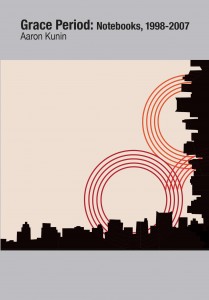 Grace Period: Notebooks, 1998-2007, Aaron Kunin (Letter Machine Editions, 2013)
Grace Period: Notebooks, 1998-2007, Aaron Kunin (Letter Machine Editions, 2013)
Here you will find at least two worlds, and then some. In an interview conducted by Tom Fleischmann in Seneca Review, Aaron Kunin said: “Is my interest in the gesture of withdrawal from the world compromised by the worldliness of the speaker positions in my writing? That is a real problem. The solution is dualism. Where in the world can I go that isn’t in the world? I can’t. To get out of the world, I need at least two worlds. That is the paradox of misanthropy: in rejecting society, you project another one.”
Fair warning: Aaron Kunin’s notes are totally addictive.
2 Comments
June 17th, 2013 / 11:00 am
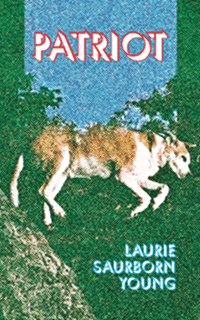 Patriot
Patriot
by Laurie Saurborn Young
Forklift, Ohio
32 pages / $5 Buy from Forklift, Ohio
Laurie Saurborn Young’s chapbook, Patriot, is a book of horizons, a book of lines – “of thunderstorms on the weather map,” of women on treadmills, of two hundred beer cans on the wall of a fourteen-year-old, of water towers and shuttered factories, of fighter planes above a parking lot in New England, of telephone poles and road kill, of “voters turned away.” The poems, thirteen total, each composed of twenty-six double-spaced lines, are each named “Patriot,” the same name as the book. This formal orderliness, along with the speaker’s measured yet persistent voice and the rank-and-file American subject matter, is in wonderful counterpoint to the great chaos of America inside the chapbook’s stapled pages. The speaker struggles to expand the definition of America, of course; but these are not Whitmanesque poems. Instead, there is a fierce constriction both in the music and imagery of these often-heavily enjambed lines, which create a shard-like collage of “America,” the place where the speaker struggles to locate herself.
The speaker of Patriot is decidedly female, and the theme of misogyny runs throughout the chapbook. The recurring image of the voting booth during an election year helps establish a sense of national urgency, and reminds the reader, specifically, of the 2012 presidential election, in which women’s rights were in the political spotlight, as right-wing politicians attacked the rights of women on multiple fronts. The speaker says, “Still throwing women in the water to see if is America.” Here, as in many of the lines of these poems, the poet uses epistrophe to delay the phrase we come to expect: “is America.” It’s a kind of reversal of Ginberg’s “America,” and gives the poems a much more feminine, feminist energy. The poems are bold, but they are not cocky or smug. They are not shouting at us. The inverted syntax and enjambments allow us to hear the internal voice of an American woman who feels genuine fear for her safety and her rights. The labyrinthine twists and turns in these poems are like a skier on a slalom – which is the exact metaphor Polish director Kristof Kieslowski used to describe what is was like to make films subject to strict censorship. In fact – and surprisingly – Kieslowski said that censorship helped him make better films. While Young’s poems are not subject to state censorship, we can hear the anxiety of utterance in this voice. These poems may at times sound cautious, but they are not afraid. On the contrary, they speak with candor, a seething anger, great intelligence, and a mesmerizing lyricism.
READ MORE >
Comments Off on A Review of Patriot, by Laurie Saurborn Young
June 17th, 2013 / 11:00 am

What Melissa Chadburn is reading this summer:
***
 An oldie but goodie that I can’t wait to return to this summer:
An oldie but goodie that I can’t wait to return to this summer:
THEM by Joyce Carol Oates
Because it’s sprawling and epic and takes it’s time and the tone of it all feels like the hottest day I ever had in Shreveport Louisiana, where the bugs gave me blisters and time passed like molasses and sometimes you want books in summer to never end like that –it’s an infinity book
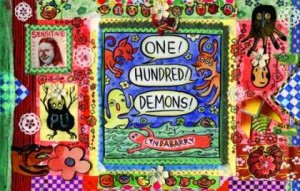 One that’s been out for awhile that I look forward to cracking open for the first time:
One that’s been out for awhile that I look forward to cracking open for the first time:
A HUNDRED DEMONS by Lynda Barry (Sasquatch Books, 2005)
Because I can’t believe I haven’t done it yet and because Lynda Barry makes me feel safe to be me and reminds me the why of it all—that it’s fun and life affirming and an act of love.
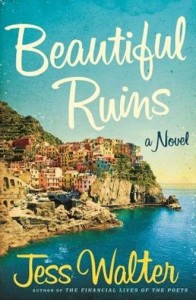 One I’ve read recently that is perfect perfect for the beach:
One I’ve read recently that is perfect perfect for the beach:
THE BEAUTIFUL RUINS by Jess Walter (Harper Perennial, 2013)
Because half the time you’ll marvel at the thing, how the hell is he doing this you’ll say with it’s mind bending structure with it’s POV twists and turns, it’s trans genreness. Then other times an honest passage like,
“This is a love story, Michael Deane says. But, really, what isn’t? Doesn’t the detective love the mystery, or the chase, or the nosy female reporter, who is even now being held against her wishes at an empty warehouse on the waterfront? Surely the serial murderer loves his victims, and the spy loves his gadgets or his country or the exotic counterspy. The ice trucker is torn between his love for ice and truck, and the competing chefs go crazy for scallops, and the pawnshop guys adore their junk, just as the Housewives live for catching glimpses of their own Botoxed brows in gilded hall mirrors, and the rocked-out dude on ‘roids totally wants to shred the ass of the tramp-tatted girl on Hookbook, and because this is reality, they are all in love—madly, truly—with the body mic clipped to their back buckle, and the producer casually suggesting just one more angle, one more Jell-O shot. And the robot loves his master, alien loves his saucer, Superman loves Lois, Lex, and Lana, Luke loves Leia (till he finds out she’s his sister), and the exorcist loves the demon even as he leaps out the window with it, in full sorrowful embrace, as Leo loves Kate and they both love the sinking ship, and the shark—God, the shark loves to eat, which is what the mafioso loves, too—eating and money and Paulie and omertia—the way the cowboy loves his horse, loves the corseted girl behind the piano bar, and sometimes loves the other cowboy, as the vampire loves night and neck, and the zombie—don’t even start with the zombie, sentimental fool; has anyone ever been more lovesick than a zombie, that pale, dull metaphor for love, all animal craving and lurching, outstretched arms, his very existence a sonnet about how much he wants those brains? This too is a love story. “
— these passages get you to throw down the microscope and pick up the mirror. Oh it’s me he’s talking to. Me. Me. Me. READ MORE >
2 Comments
June 14th, 2013 / 11:00 am
 Could You Be With Her Now
Could You Be With Her Now
by Jen Michalski
Dzanc Books, 2013
180 pages / $15.95 Buy from Amazon or Dzanc Books
Stephen King called novellas an “ill-defined and disreputable literary banana republic.” In Jen Michalski’s Could You Be With Her Now, she gives us two very different samples of the republic. “May-September” is about a May-December romance and is lyrically written with a fascinating sensuality exploring relationships through the rhythms of music and stories. “I Can Make It To California Before It’s Time For Dinner” is about a mentally challenged fourteen-year-old who undertakes a haunting journey and is also a social commentary on the nature of entertainment when it intersects with reality. Together, they comprise a powerful one-two punch on the ecology of longing and desire, though it was the odyssey in “I Can Make It To California Before It’s Time For Dinner” that compelled me to write this review and what I’ll be focusing on.
In the novella, Jimmy, the mentally challenged boy who serves as narrator, can’t differentiate reality from TV. That’s why he thinks the actress on the screen, Megan, is his girlfriend. When his brother, Josh, challenges him to find her, he mistakes a local girl for the actress and accosts her. Throughout, the writing is deceptively simple, mimicking the tones of a young boy while blurring the boundaries between reality and illusion as we’re sucked into Jimmy’s world. “I pretend I’m a dinosaur eating people,” he says, and there’s a charm in the way he interprets experiences that are confusing to him through the prism of television and family anecdotes. The voice Michalski creates is funny and yet consistently unique in the way his view of the world is so fragmented. In some ways, when I initially read the description about the novella, I thought of Lenny from John Steinbeck’s Of Mice and Men. They are both beautifully written to fit the narrative and weave a haunting track of prose. But the parallels end quickly when Jimmy gets into a scuffle with the girl, and in a moment of panic, kills her, thinking merely that she’s gone to sleep. Again, the diction shows us that Jimmy is unaware of the gravity of what he’s done and he gets lost after his brother sends him away to hide from the police.
Jimmy wanders into a group of truckers at a gas station where he meets Ed. His only point of reference for strangers are cartoons. Ed is “short and fat like a Weeble and has a moustache like Yosemite Sam, but he is not a cartoon he is a real man.” In this case, entertainment gives him a false sense of comfort and when Ed offers to take him home out of concern, Jimmy goes along. But it becomes clear that taking him home is the furthest thing from Ed’s mind. The interactions between Ed and Jimmy start off innocently enough, but get brutally graphic and disturbing. Ed is a sexual predator, intending to exploit Jimmy. Jimmy, oblivious to the danger he’s in, explains his experiences with an innocence that makes every sentence difficult to read for everything that we have to read between the lines. Michalski constructs two layers of understanding to contrast Jimmy’s inability to understand what’s really going and the reality that the reader is forced to fill in between the gaps, resulting in an even more disturbing experience: “My legs are tired and they want to sleep and so do I. I am mad at Josh but when I get home I won’t hate him because he is my brother. God hears everything I say so I love Josh, love Josh, love Josh. Also, God, please I am lost and I need a telephone and a puppy for Christmas.”
READ MORE >
3 Comments
June 14th, 2013 / 11:00 am

Photo Credit: Daniel Nicoletta
Kevin Killan’s summer reading picks:
***
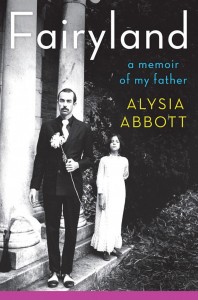 While waiting for Dodie Bellamy’s Cunt Norton to appear from Les Figues later on this summer, I’ll recommend a few books I know are already out. Fairyland, by Alysia Abbott (Norton) is the memoir of a young woman who grew up in the Haight-Ashbury, the only child of a single gay dad, and what happens when AIDS comes in to blow up her fragile world once again. Steve Abbott was a talented poet, thinker, novelist—and the man who coined the expression “New Narrative,”—one of my very first friends here in San Francisco. He’d be proud of the way his beloved and beautiful daughter has returned him to the world he left.
While waiting for Dodie Bellamy’s Cunt Norton to appear from Les Figues later on this summer, I’ll recommend a few books I know are already out. Fairyland, by Alysia Abbott (Norton) is the memoir of a young woman who grew up in the Haight-Ashbury, the only child of a single gay dad, and what happens when AIDS comes in to blow up her fragile world once again. Steve Abbott was a talented poet, thinker, novelist—and the man who coined the expression “New Narrative,”—one of my very first friends here in San Francisco. He’d be proud of the way his beloved and beautiful daughter has returned him to the world he left.
 I’ve been reading Dance for Export: Cultural Diplomacy and the Cold War with much pleasure this weekend and last. In recent years I’ve come to understand generally that the Cold War of my youth impacted just about everything in culture too, as well as ideology, and that the US government secretly poured zillions of dollars into a propaganda game against the Russians to convince the world that, say, US abstract art was better than old-fashioned social realism. Naima Prevotz’ dance history brings us unto the Betlway and Manhattan boardrooms where specialized panels met to debate which US dance troupes were worthy of international exposure (Martha Graham, Jose Limon), and which were too avant-garde (Alwin Nikolais) or too politically suspect (Katherine Dunham). In general the US has always been eager to show the rest of the world what nice guys we are, and what great artists, and you know, for years I believed it. Now I see it’s all been a charade of spy vs spy, money vs. money.
I’ve been reading Dance for Export: Cultural Diplomacy and the Cold War with much pleasure this weekend and last. In recent years I’ve come to understand generally that the Cold War of my youth impacted just about everything in culture too, as well as ideology, and that the US government secretly poured zillions of dollars into a propaganda game against the Russians to convince the world that, say, US abstract art was better than old-fashioned social realism. Naima Prevotz’ dance history brings us unto the Betlway and Manhattan boardrooms where specialized panels met to debate which US dance troupes were worthy of international exposure (Martha Graham, Jose Limon), and which were too avant-garde (Alwin Nikolais) or too politically suspect (Katherine Dunham). In general the US has always been eager to show the rest of the world what nice guys we are, and what great artists, and you know, for years I believed it. Now I see it’s all been a charade of spy vs spy, money vs. money.
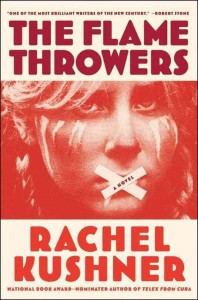 Some of this general background plays out in Rachel Kushner’s new novel The Flame Throwers—a book that needs no introduction from me but a stunning one nevertheless. I’m one who loved Telex from Cuba and have resented the years that have limped on by while I’ve been slavering for a new Kushner novel! Now here it is and I’m still in awe. Her novel of a woman driven by speed and curiosity to flout transnational borders in the service of avant-garde art reminds me so much of one of my old favorites, Joan Didion’s Play It As It Lays. But it’s as if there where a Joan Didion who knew about art instead of finding it, like all modern practices, ridiculous and appalling.
Some of this general background plays out in Rachel Kushner’s new novel The Flame Throwers—a book that needs no introduction from me but a stunning one nevertheless. I’m one who loved Telex from Cuba and have resented the years that have limped on by while I’ve been slavering for a new Kushner novel! Now here it is and I’m still in awe. Her novel of a woman driven by speed and curiosity to flout transnational borders in the service of avant-garde art reminds me so much of one of my old favorites, Joan Didion’s Play It As It Lays. But it’s as if there where a Joan Didion who knew about art instead of finding it, like all modern practices, ridiculous and appalling.
READ MORE >
1 Comment
June 13th, 2013 / 11:05 am

Amina Cain’s summer reading recommendations:
***
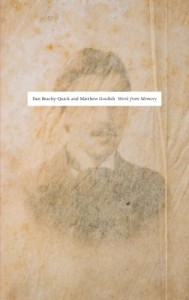 Work from Memory by Dan Beachy-Quick and Matthew Goulish (Ahsahta Press, 2012)
Work from Memory by Dan Beachy-Quick and Matthew Goulish (Ahsahta Press, 2012)
My first three recommendations are books I myself plan to read this summer (and you should too!) and this one is at the top of my list. Work from Memory is in response to In Search of Lost Time by Marcel Proust, and Goulish is a performer whose work with Goat Island I’ve loved as much as any of my favorite books and those performances have taught me as much about writing as reading has. I’m also fond of Dan Beachy-Quick’s work because of what feels to me like a deep calmness within it. I can only imagine the territory the two of them cross into here.
 Murder by Danielle Collobert, trans. Nathanaël (Litmus, 2013)
Murder by Danielle Collobert, trans. Nathanaël (Litmus, 2013)
This is a short novel I’ve been waiting for all year, dedicated reader of Danielle Collobert (and Nathanaël) that I am. Another title by Collobert, It Then, is one of the most brutal books I’ve ever encountered, performative in its brutality and fragmented in a way that is more elegant than I thought fragments could be. Murder was written during the Algerian war and originally published by Éditions Gallimard in 1964, and from what I can tell, looks closely at the severity of human existence.
4 Comments
June 12th, 2013 / 11:00 am
We had one semester to make a game.
The class was through the California Institute of the Arts’ Integrated Media department, which styles itself a meeting ground for complimentary métiers. It met each Monday morning in the school’s chilly bowels for a scant two hours – just enough time to write something on a chalk board, high-five or disagree, and then not see each other for a week. It’s a wonder we made anything at all, let alone debuted a prototype at a crowded convention called the Maker Faire three hundred miles north. What we brought is not what we intended – a partially miscarried hybrid of real and vestigial features – but game development, like any collaborative undertaking, isn’t a straight shot.

Our group was nigh-ideal: five graduate students and one talented BFA, no one from the same background. There was a programmer, a theater set designer, two breeds of visual artist, an ambient musician, and myself – the writer. Previous groups had gone the techy route, rigging RC cars with baby monitors, but we wanted to straddle multiple media – to build a game that played in physical spaces, drew from digital content, and answered to verbal interaction. By the end of our first class we had a draft.
“I’ve never seen a game come together so quickly!” the class’ instructor announced. “It’ll be great at the Maker Faire.”
That’s the thing, though – you can chart a voyage to the moon, but landing on the surface is another thing entirely. High-concept ambitions are irrelevant until you see them through.
Our design on paper was a monster, something you would murder if you found it in a lab. The hulking Franken-game included real-world installations, app-based digital avatars, RPG-esque progression, and heavy narrative content.
Sounds rad, right? Proposals often do.
READ MORE >
Behind the Scenes / 5 Comments
June 11th, 2013 / 11:00 am
Johannes Göransson shares what’s he’s reading this summer:
***
This summer I’m reading:
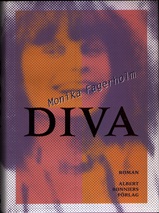 Monika Fagerholm’s novel Diva: It’s a novel about this girl Diva who does some crazy stuff, but it’s also about a whole cast of characters, such as TruthMary and her sister Kari. Kari loses the ability to speak so she tries to re-learn it by listening to recordings of herself saying basic sentences, which Diva hears through the wall (they’re neighbors). And her hair grows really long so she lets it out and the neighborhood boys climb up on it. Years later Kari lights herself on fire in a telephone booth. The book is written in this incredibly cyclical style, where the same story gets told over and over, slowly revealing more and more details. I don’t think this book has been translated, but some of her more comprehensible books have been translated: American Girl and Glitter Scene. I’m going to read those too.
Monika Fagerholm’s novel Diva: It’s a novel about this girl Diva who does some crazy stuff, but it’s also about a whole cast of characters, such as TruthMary and her sister Kari. Kari loses the ability to speak so she tries to re-learn it by listening to recordings of herself saying basic sentences, which Diva hears through the wall (they’re neighbors). And her hair grows really long so she lets it out and the neighborhood boys climb up on it. Years later Kari lights herself on fire in a telephone booth. The book is written in this incredibly cyclical style, where the same story gets told over and over, slowly revealing more and more details. I don’t think this book has been translated, but some of her more comprehensible books have been translated: American Girl and Glitter Scene. I’m going to read those too.
Diva is one of the key texts in Maria Margareta Osterholm’s critical book, Ett Flicklaboratorium i Valda Bitar (A Girl Laboratory in Selected Pieces), which explores the figure and aesthetics of the girl as it pertained to Swedish literature. Osterholm also introduced the term “Gurlesque” to Swedish culture, and this term has generated a lot of discussion in the newspapers and has helped draw attention to some of the best young Swedish writers, such as Aylin Bloch Boynukisa and Sara Tuss Efrik. So I’m going to read this book.
READ MORE >
Comments Off on Johannes Göransson’s SUMMER READS
June 11th, 2013 / 11:00 am


 #2 of The Quarterly
#2 of The Quarterly
 Follow Her Home
Follow Her Home

 Pantera negra. El arte revolucionario de Emory Douglas, ed. Sam Durant (Alias, 2012)
Pantera negra. El arte revolucionario de Emory Douglas, ed. Sam Durant (Alias, 2012)














 Monika Fagerholm’s novel Diva: It’s a novel about this girl Diva who does some crazy stuff, but it’s also about a whole cast of characters, such as TruthMary and her sister Kari. Kari loses the ability to speak so she tries to re-learn it by listening to recordings of herself saying basic sentences, which Diva hears through the wall (they’re neighbors). And her hair grows really long so she lets it out and the neighborhood boys climb up on it. Years later Kari lights herself on fire in a telephone booth. The book is written in this incredibly cyclical style, where the same story gets told over and over, slowly revealing more and more details. I don’t think this book has been translated, but some of her more comprehensible books have been translated:
Monika Fagerholm’s novel Diva: It’s a novel about this girl Diva who does some crazy stuff, but it’s also about a whole cast of characters, such as TruthMary and her sister Kari. Kari loses the ability to speak so she tries to re-learn it by listening to recordings of herself saying basic sentences, which Diva hears through the wall (they’re neighbors). And her hair grows really long so she lets it out and the neighborhood boys climb up on it. Years later Kari lights herself on fire in a telephone booth. The book is written in this incredibly cyclical style, where the same story gets told over and over, slowly revealing more and more details. I don’t think this book has been translated, but some of her more comprehensible books have been translated: